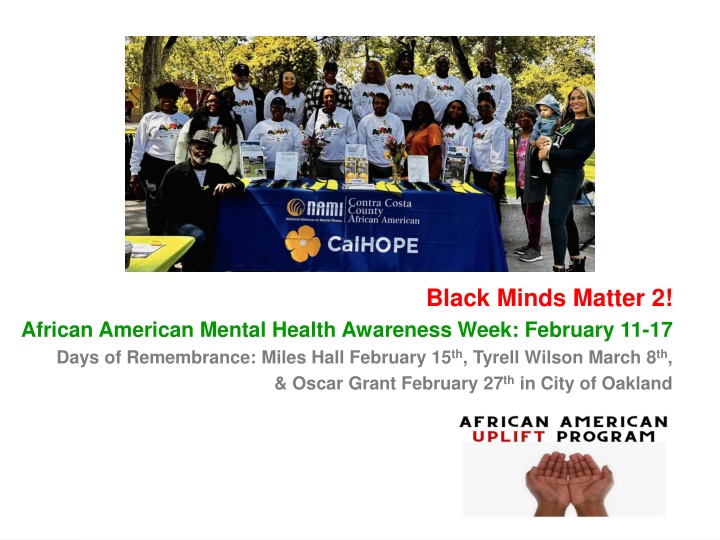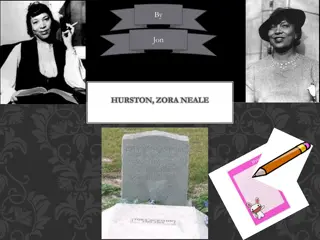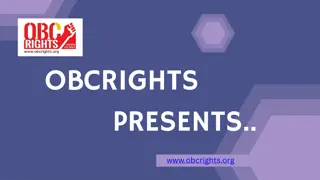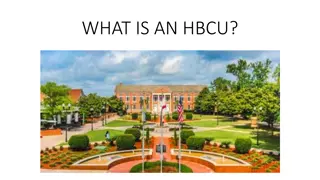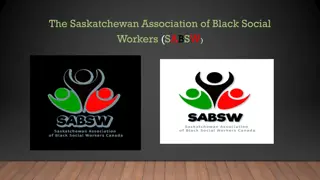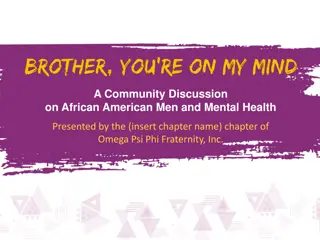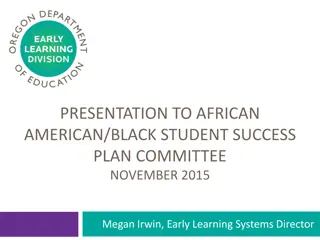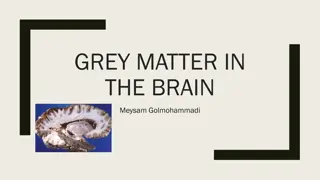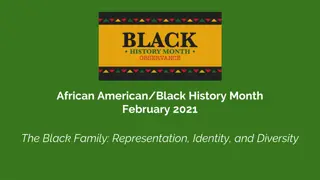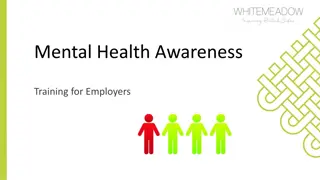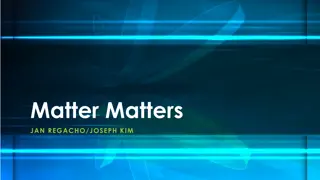Black Minds Matter 2: Advocating for African American Mental Health Awareness
Promoting African American mental health awareness through initiatives like Black Minds Matter 2, focused on holistic wellness and community support. Advocacy for racial sensitivity and cultural understanding in mental health services to address needs effectively. Survey insights show importance of spirituality in mental health care for African Americans. Highlighting challenges faced by African American families in navigating mental health systems.
Download Presentation

Please find below an Image/Link to download the presentation.
The content on the website is provided AS IS for your information and personal use only. It may not be sold, licensed, or shared on other websites without obtaining consent from the author.If you encounter any issues during the download, it is possible that the publisher has removed the file from their server.
You are allowed to download the files provided on this website for personal or commercial use, subject to the condition that they are used lawfully. All files are the property of their respective owners.
The content on the website is provided AS IS for your information and personal use only. It may not be sold, licensed, or shared on other websites without obtaining consent from the author.
E N D
Presentation Transcript
Black Minds Matter 2! African American Mental Health Awareness Week: February 11-17 Days of Remembrance: Miles Hall February 15th, Tyrell Wilson March 8th, & Oscar Grant February 27th in City of Oakland 1
Welcome to a transformACTIONal experience Gigi R. Crowder, L.E. Native of Oakland California, Mom of identical 32 years old twin sons. Executive Director of NAMI Contra Costa. Also, Founder of Black Minds Matter 2! Committed to improving health outcomes for individuals and their families impacted by mental illness. 2024 Primary focus supporting efforts to promote African American Holistic Wellness and Resource Hubs throughout the nation.
The Birth of Black Minds Matter 2! Sharing my Story
When a Black Mother gives birth to a male child, her sleep is forever compromised! Dr. Kenneth V. Hardy, PhD Consultant at Eikenberg Academy for Social Justice
My Most Recent Experience Advocating for African American Children We can t begin to address the issues that will lead to fair practices amongst mental health providers until we come to a point where all providers lead to be racially sensitive which should be followed by racial responsibility.
Peers and Family Member Survey Over 2600 respondents 88% of African-American mental health consumers and family members across California report that spirituality is important to them. 72% report that they believe it is appropriate for the public mental health system to address spirituality as a part of mental health care. 89% reported that they regularly used prayer as a wellness tool
African American Family Support Group Largely attended by mothers. Many of whose children are criminal justice involved. Most of the parents in the group share a similar burden which is, feeling like the mental health system and providers can t relate to the cultural needs of their children and discount the trauma and further impact of dealing with a one-size-fits-all Western paradigm that has often devalued the opinions of families.
MHFC Signature Trainings Mental Health 101 for African Americans Spirituality 101 Provider Training I m A Winner Every Child needs an IEP Keepers of the Flock Faith Leader Training A Bridge Over Troubled Waters
A Mental Health Friendly A Mental Health Friendly Provider Provider is is A Provider committed to eliminating stigma and improving outcomes for African American Peers/Patients and family members through utilizing culturally responsive practices/approaches that create a sense of belonging and inclusion in all facets of it s treatment models and programs.
Purpose Identify issues and concerns surrounding mental health and substance abuse services in the African American community Provide recommendations to make services more effective and culturally appropriate Support Alameda County s Strategic Vision within local/state/federal budget realities
Issues Addressed Biased and inaccurate diagnoses Disparities in utilization of services (e.g. over- representation in restrictive, often involuntary, settings), yet inconsistent outcomes Societal factors: cultural stigma, historical trauma, discrimination Multiple health care providers; piecemeal services; incorrect medications Need for non-behavioral health community supports 12
The Landscape Fewer than 4% of social workers and 2% of psychologists and psychiatrists in U.S. are African American (National Association of Black Social Workers) Incentive programs for targeted recruitment and professional mentoring African American students are more likely to be suspended from school then any other at an alarming rate African American living with mental illness are more likely to be incarcerated Nationally, 63% of African Americans view depression as a personal weakness (Mental Health America Survey) Co-occurring diagnoses and self-medication affect 70% of all BHCS consumers (BHCS System Data)
What do all people need to feel good about themselves and thrive? Please put your responses in the chat That s true for African Americans too!
FACTS: Children & Youth (Birth-Age 16) Inappropriate diagnoses due to lack of culturally informed medical knowledge Over-representation in foster care, out-of-home and juvenile justice systems Child, youth or family often unable to provide historical background or context SAMHSA issued an Urgent Report: 7/2019 Recent research has shown that Black youth were approximately two times more likely to die by suicide than their White counterparts. Black students also had a higher rate of suicide attempts when compared to their White and Hispanic counterparts. Today Suicide is the 3rd cause of death for black males ages 1-19
RECOMMENDATIONS: Children and Youth 1. Promote Clarifying Assessments & community-based consultations 2. Utilize natural resources such as those found in faith communities 3. Increase referrals and info- sharing among providers, family and other service agencies 4. Increase the inclusion of child and family in treatment planning 16
Community Defined Strategy: I Am A Winner! Purpose: Specific community defined strategies for ages 3-18 years old. Empower and equip the African American community to reconnect and heal from within to protect our youth. Designed to reduce Mental Health Stigma and Disparities and promote mental wellness using a faith based culturally responsive approach for our most precious commodity by pairing faith centers with local schools.
I AM A WINNER! Volunteer opportunities for local Seniors Reduce stigma by ensuring all students have an IEP, Individualized Empowerment Plan STEM vs. HISTEM Goal Setting and Rites of Passage
Things to Consider When Working with African Americans Parts of this shared cultural experience family connections, values, expression through spirituality or music, reliance on community and religious networks are enriching and can be great sources of strength and support. However, another part of this shared experience - being subject to racism, discrimination and inequity- can significantly affect a person s mental health. According to the American Psychiatric Association s Mental Health Facts for African Americans guide, they are also: Less likely to receive guideline-consistent care Less frequently included in research More likely to use emergency rooms or primary care (rather than mental health specialists)
Challenges African American of all ages are harmed by a one size fit all system Children express depression differently; I have a stomachache! Diagnosed with external disorders, ADHD, conduct disorders, instead of underlying depression Still Face Experiment with babies Distance Learning
Opportunities Empower school aged children Affirmations I am a Queen - King! I am a Winner! Nurture verses condemning those exposed to trauma From Trauma Informed Care to Healing Centered Engagement Restorative Justice Mentoring
What Can You Do Differently Remembering Black Minds Matter 2?!
